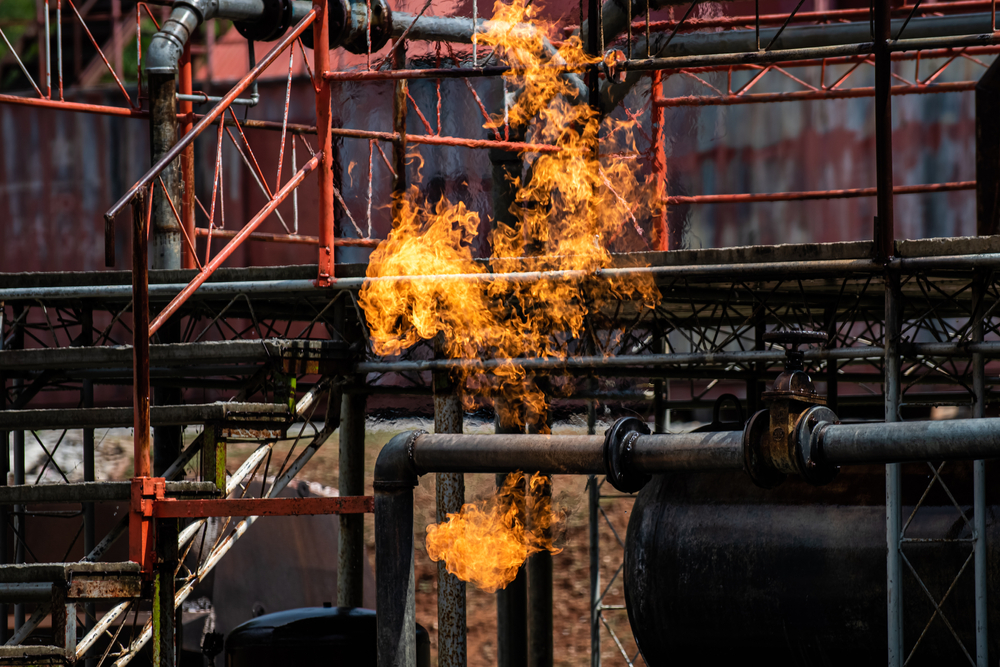Six safety lapses led to an April 2018 refinery explosion and fire at the Husky Superior Refinery in Superior, Wisconsin, that injured 36 workers, caused roughly $550 million in damage to the facility, and released 39,000 pounds of flammable hydrocarbon vapor into the air, according to a final report released December 29 by the U.S. Chemical Safety and Hazard Investigation Board (CSB).
Husky Energy purchased the Superior Refinery from Calumet Specialty Products, LP, less than six months earlier in November 2017. The incident occurred while the refinery was shutting down its fluid catalytic cracking (FCC) unit to perform planned maintenance.
Two vessels in the FCC unit exploded, propelling metal fragments up to 1,200 feet away, puncturing a nearby asphalt storage tank at the refinery, and spilling approximately 17,000 barrels of hot asphalt that ignited multiple fires. Over 2,500 residents of the city of Superior were evacuated from their homes. The city of Duluth, Minnesota, issued a shelter-in-place order.
The six key safety issues identified in the report included:
- Transient operation safeguards. Transient operations like shutting down for a maintenance outage is when a process is not operating in its normal state. At Husky Superior Refinery, essential transient operation safeguards at the FCC unit were either not implemented or not effective at the time of the incident.
- Process knowledge. Throughout Superior Refinery’s history under several owners, the refinery’s FCC expertise was mostly in-house. At the time of the incident, Husky Superior Refinery employees did not adequately understand or know how to effectively control the FCC unit’s transient operation hazards.
- Process safety management. Husky Superior Refinery failed to adequately maintain process safety information, operating procedures, process hazard analyses, and operator training for its FCC unit.
- Industry knowledge and guidance. The Husky incident occurred less than a year after the CSB released a final report in its investigation of another FCC unit in California. Industry trade groups distributed lessons learned from the California incident, as well as the CSB’s video. However, Husky Superior Refinery employees were not aware of or did not learn lessons from the 2015 California incident in a way that could have helped them prevent the April 2018 incident. There currently is no industry publication establishing common basic process safety practices for all FCC units. More than six companies develop and license FCC technology, and portions of many older FCC units have been revamped by multiple technology licensors. Each has its own designs and configurations.
- Brittle fracture during extreme events. The primary absorber and sponge absorber vessels in Superior Refinery’s FCC unit failed by brittle fracture or shattering, which sent more than 100 pieces of metal debris throughout the refinery, with some striking the asphalt tank. It was determined that those existing vessels were not made of the newer grades of steel with better toughness properties that are now recommended for new vessels. With the newer grades of steel, should the equipment fail, it should tear open and be less likely to result in metal debris fragments affecting the surrounding area.
- Emergency preparedness. Husky Superior Refinery did not prevent the asphalt from catching on fire due to the size of the asphalt release and competing priorities during the FCC unit explosion, such as attending to worker injuries and extinguishing existing fires at the FCC unit.
The Occupational Safety and Health Administration (OSHA) has a rulemaking to revise its process safety management standard to better address major chemical accidents. The CSB currently has 16 open recommendations for OSHA to address. OSHA also has a rulemaking to consolidate and update emergency preparedness and response requirements in a single standard.

